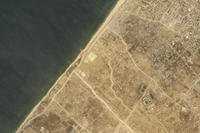The Pentagon has chosen to close the Air-Sea Battle Office and fold their work into a new section of the Joint Staff, according to a memorandum issued on Jan. 8 that was published by the U.S. Naval Institute.
Air-Sea Battle was a concept introduced by the Air Force and Navy in 2009 that was stood up to devise strategies for the military services to work together to defeat advanced militaries like China. The concept was designed to help U.S. forces gain access to contested areas and project power.
Air Force and Navy leaders said the new concept is needed in order to deal with advanced worldwide threats. Advances in ballistic missiles, jamming equipment and anti-aircraft weaponry had forced service leaders to review strategies going forward.
However, the introduction of the concept occurred while the military was in the heat of fighting two ground wars in Iraq and Afghanistan. Service officials for the Air Force and Navy were forced to defend why additional resources should be put toward devising strategies against a new threat when the U.S. Army and Marine Corps were bearing the brunt of the fight in the Middle East.
Some observers even saw it as a budgeting strategy to march out the Air Sea Battle concept during Congressional hearings in order to justify continued investment in big ticket weapons programs for the Air Force and Navy.
Four years since it's inception with the combat missions in Iraq and Afghanistan ended, the Air Sea Battle Office is closing its doors, but the Pentagon insists the work will continue. The Joint Staff will spend the rest of the year working the Air Sea Battle strategies into a new concept called Joint Concept for Access and Maneuver in the Global Commons, with a report due by the end of the years, according to USNI.
The rub with Air Sea Battle was always the seeming exclusivity to the Air Force and Navy. Army generals were typically miffed when asked what role the Army would have under the concept that was receiving so much attention in Congressional circles.
A Pentagon spokesman acknowledged to USNI editor Sam LaGrone that the Air Sea Battle name was a problem and the move to the Joint Staff will allow for the strategy discussions to encompass America's land forces.
“The missing part of the Air Sea Battle concept was the land portion, basically how the land forces could be used to allow U.S. forces to gain access to a contested area,” a Defense Department spokesman told USNI.
The Joint Staff's J-7 directorate will be the ones to take on the task of issuing the report and it's unclear how many resources they will dedicate to it. It should be interesting to see what sort of staff the Pentagon plans to dedicate to this or simply allow the Air Sea Battle name to drift away.
The concept was designed to address the anti-access/area denial (A2/AD) threat. Based on the Pentagon's budget and planning documents, that threat will remain a priority.








